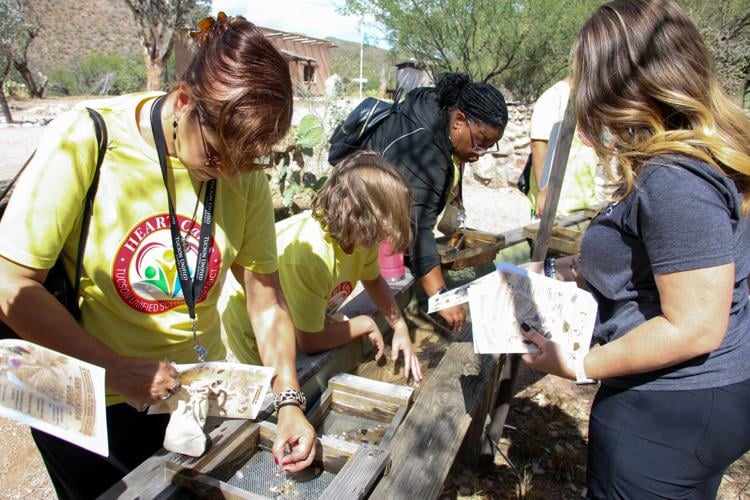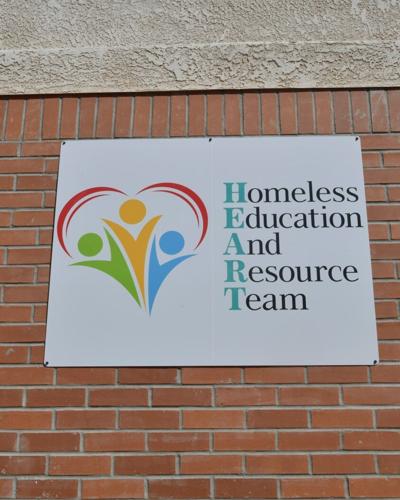Danitza, a 34-year-old Tucson mom, shares a one-bedroom shelter space with her three children. After school her studious 9-year-old daughter curls up in the bathtub so she can study away from the chaos. She takes a pillow and blanket with her and shuts the door.
She tells her mother, “‘When we’re back on our feet, and we’re stable and all that, I’m having my own room.’”
Though lacking permanent housing, her family is lucky, Danitza said. Her school-aged kids are enrolled in a Tucson Unified school they love and they have a place to stay.
“Imagine you don’t have family — you don’t have nobody around, you’ve been through a lot," she said. "It’s nice to know that there’s still good people around, and good organizations and good programs that are blessings.”
For families without even temporary shelter, one such program is new.
Tucson Unified School District now offers an emergency housing support program using federal money to help families as crises befall them.
There’s a growing need, as Danitza and her family are far from alone. In Arizona, during the 2020-2021 school year, nearly 14,000 students were homeless.
In Pima County there’s been a 16.3% increase since the pandemic in the number of individuals living in unhealthy, unsheltered or inadequate living facilities, said Kinasha Brown, who helps lead TUSD’s department of equity, diversity and inclusiveness.
Kris Neal, who works with TUSD’s homeless youth, said it’s not uncommon to see children doing homework in areas homeless families congregate.
Outreach workers say they sometimes see high school students doing homework under trees in Tucson homeless camps. At local shelters it’s a regular sight to see children get dropped off by school buses after classes.
“Our goal is to make sure we can give them the resources that they need during this temporary time of transition,” Brown said. “We know that being unsheltered or homeless does not just affect one person. It affects families. It affects our community.”
TUSD families qualifying for the emergency housing program are put up in a partnering hotel for up to four days and three nights — ideally enough time to come up with a long-term plan. They may use the emergency fund once per school year.
Those receiving the help may also get gas cards and internet access. Incidentals and hotel costs beyond the allotted time are the family’s responsibility.
“At no point at all are we thinking we’re solving (housing insecurity),” Neal said. “But it does provide that shelter, no worries, for three days.”
During that time social services professionals can look for other resources, he said.
20 families served so far
The new TUSD program was developed under the McKinney Vento Act. The act ensures that homeless students receive educational services comparable to those provided to other students, based on the child’s needs.
“McKinney Vento is the federal piece that says we’re going to offer certain rights to our students if they find themselves homeless,” Brown said.
Homelessness as defined by McKinney Vento is a lack of basic, regular or an adequate nighttime residence.
The district is hovering around 1,800 McKinney Vento-qualifying families, Brown told the TUSD board at its Sept. 12 meeting.
American Rescue Plan II funding helps support the emergency fund. TUSD has $146,735 budgeted under American Rescue Plan-Homeless for fiscal year 2023.
The housing program itself is funded through 2024, but TUSD officials say they are looking for a way to “sustain the program.”
TUSD says it costs about $320 to rehome a family for a four-day, three-night stay.
Since late September, 20 families have been served.
“Saving grace”
Kris Neal is part of the HEART (Homeless Education and Resource Team) Cares program at TUSD, which offers assistance to homeless students and their families, many under McKinney Vento.
Neal said he’s witnessed TUSD’s emergency housing be the “saving grace” for families — at least for 72 hours.
“Those three days we try to find something to help them get set up with a Section Eight voucher or a shelter — some kind of lodging — so at least leaving they can have a bit of stability.”
Elsewhere, there are more than 50 children housed in Wildcat Inn, a shelter for families in Tucson. Since its opening in February 2022, the shelter has served 130 children, along with their families.
The facility, a repurposed motel, sometimes includes McKinney Vento families, said Allison Chappell, who leads Wildcat Inn’s shelter operations.
“If (the school district has) a homeless family that they’re working with … they call directly to see if we have any openings or a way to help the family get into shelter,” she said.
The motivation behind Tucson Unified’s emergency housing program is to keep families unified and kids in school.
“We don’t want things like homelessness or being unsheltered to define our kids’ future here at TUSD,” Brown said.
In Arizona, 58.5% of homeless students were chronically absent during the 2020-2021 school year, according to a report from the National Center for Homeless Education.
Arizona’s English Language Arts Assessments report 4% of homeless fourth-grade students at TUSD were “highly proficient.” Eighteen percent were “proficient,” 4% were “partially proficient” and 74% were “minimally proficient,” according to testing. Those numbers are lower in most categories than for the district’s general population of fourth-graders.
That year TUSD’s state assessments also showed the district’s homeless students under-performing their peers in math.
“Such a blessing”
HEART Cares helps ease burdens for TUSD families affected by housing insecurity, providing resources and services, including school necessities.
“Anything that they might need for school — scientific calculator, new uniform, backpack … anything,” Neal explained.
Danitza’s children are among those who have benefitted from HEART.
“That was such a blessing because I’m literally counting like the dollars to put gas in my car to try to manage and get the stuff my kids needed,” she said.
Though grateful, Danitza says her family is careful not to disclose their housing situation. (For their safety and security, the Star isn’t using Danitza’s last name and her children’s names.)
Homelessness doesn’t always look the same, Brown said.
“There are a lot of stereotypes about homeless people, maybe that they’re lazy, maybe that they (are mentally ill),” Brown said.
“That’s not it,” she said. “We’re living in a time of inflation. People are losing their housing to economic hardship. Some are living in motels, hotels, trailer parks.”
“A hard thing to be okay with”
Chappell said people outside social services don’t necessarily understand the gravity of the state of homelessness in Tucson.
“I don’t think they understand … what’s actually happening,” she said. “The fact that we do have little children that are sitting in tents and cars and in my opinion — that’s a hard thing to be okay with.”
It’s rough out there, Neal said. “It’s really rough.”
Danitza and her kids had a place to stay for some time, under construction and rented for well under market value. Things were good, Danitza said.
Then, along came a spider.
A brown recluse spider bite sent Danitza on a lengthy hospital stay and recovery journey. She was unable to work. Danitza pulls up photos on her cell phone. They show a crevice in her leg, where the bite area was removed. Bruise-like marks, a sign of sepsis, are scattered across her leg in the photos.
“Two times I had paperwork for my daughters who I was going to leave them with (if I died),” Danitza said. “It was scary.”
Just before she was bitten, Danitza was told her family would have to vacate their rental house.
Roughly a year after the bite, Danitza is on the road to recovery and looking forward to working again. The family has a safe home at a shelter, and Danitza is working towards moving into Section Eight housing.
“They know we’re in a process,” Danitza said of her children. “They know that we’re heading some direction. My oldest is always saying, ‘When we’re back on our feet, mom ….’ ”
Sometimes, Danitza gets frustrated, she said.
“I can’t do nothing, I can’t provide. I have a kid on the spectrum, two daughters that had to go to school.”
Because of community support, the kids continued school at their schools of origin. Under McKinney Vento, homeless students have a right to attend the school the child attended during their last permanent residence, or the school in which the student was last enrolled.
Seeing kids arriving at their temporary home from school is a “bright spot” in Wildcat Inn staff members’ day, Chappell said.
“They get off the bus and they run into the gate,” Chappell said. “They come back and say something fun they did at school that day.”
That night, they’ll have a stable place to sleep and study.
Get your morning recap of today's local news and read the full stories here: tucne.ws/morning





